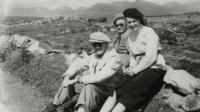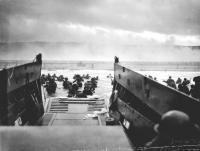An interesting and varied career
Published in 20th-century / Contemporary History, Features, Issue 4 (July/August 2012), Volume 20
John Ford and Maureen O’Hara on the set of The Quiet Man (1952)—Killanin assisted in its production.
Michael Morris was born in London on 30 July 1914, the son of the Honourable George Morris and Dora Wesley Hall. His father was one of the fourteen families making up the Tribes of Galway, but he was killed in action very shortly after Michael’s birth, on 1 September 1914 near Villers-Cotterêts, France, while commanding the 1st Battalion Irish Guards in the Great War.
Michael Morris succeeded to the title of Lord Killanin when he was thirteen years old, upon the death of his uncle. This enabled Morris to sit in the House of Lords as Lord Killanin when he turned 21. Educated at Eton, the Sorbonne and Magdalene College, Cambridge, where he boxed, rowed and played rugby, Lord Killanin’s first sporting love was horse-racing. Early on he also displayed a talent for drama, serving as president of the Cambridge University Dramatic Club, the ‘Footlights’.
After graduation, Killanin began a career as a journalist in the 1930s, first joining the Daily Express in London and then moving to the Daily Sketch. He later became the political and diplomatic correspondent for the Daily Mail and its sister publication the Sunday Dispatch, serving in 1937–8 as a war correspondent during the second Sino-Japanese War. When European war was imminent, Lord Killanin volunteered for the King’s Royal Rifle Corps and was commissioned in November 1938 into the Queen’s Westminsters, into which he helped recruit a number of friends, who were also journalists or actors. He later participated in the Normandy landings as a brigade major with the 30th Armoured Battalion, part of the 79th Armoured Division, for which he was later awarded an MBE. Lord Killanin resigned his army commission in 1951 and returned to Ireland.
Continuing his writing, in 1948 he wrote a biography of the eighteenth-century portrait-painter and court artist to King George I, Sir Godfrey Kneller and his times, 1646–1723. He would eventually write numerous books, including two compendiums on the history of the Olympics, The Olympic Games (1980) and The Olympic Games 1984 (1984), in addition to his autobiography, which came out in 1983, My Olympic years: Lord Killanin—President of the International Olympic Committee 1972–1980. In 1975 he and Professor Michael Duignan of UCG published The Shell Guide to Ireland, and in 1987 Lord Killanin wrote My Ireland.

D-Day, 6 June 1944. Killanin participated in the Normandy landings as a brigade major with the 30th Armoured Battalion, part of the 79th Armoured Division, for which he was later awarded an MBE.
At the end of the war, in 1945, he married Mary Sheila Cathcart Dunlop (1918–2007) of Oughterard, Co. Galway, who herself received an MBE for her work during the war in helping to break the famous German codes ‘Ultra’ and ‘Enigma’. The couple would have three sons, George Redmond (‘Red’, a film producer), Michael (‘Mouse’, a racehorse trainer, later to be the 4th Baron Killanin) and John (a photographer), and one daughter, Deborah.
After the war, Lord Killanin served as a director of several companies and turned to film-making, assisting the American director John Ford with the production of The Quiet Man. He also worked on numerous other films, helping to produce The Playboy of the Western World, The Rising of the Moon, Gideon’s Day, Young Cassidy and Alfred the Great, and he wrote the screenplay for Connemara and his pony. He maintained his love of horses, becoming a member of the Irish Turf Club in 1971, serving as steward from 1973 to 1975 and in 1981, and was a member of the Irish National Hunt Steeplechase Committee. Lord Killanin would also serve as honorary consul-general in Ireland from 1961 to 1984.
















